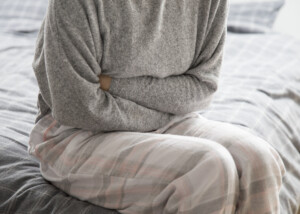
If you’ve been diagnosed with microscopic colitis, you’re no doubt wondering if this inflammatory bowel condition can go away on its own, or spontaneously resolve.
After all, half of all cases of microscopic colitis present with sudden onset diarrhea; diarrhea is the hallmark symptom of this benign condition.
I was diagnosed with microscopic colitis some years ago, not long after a bout of sudden-onset, watery diarrhea that didn’t seem to want to go away.
Diagnosis of microscopic colitis is confirmed with a tissue sample of the large colon, obtained via colonoscopy, and then examined under a microscope, hence the name “microscopic colitis.”
My gastroenterologist told me that the condition would “resolve on its own in a few weeks.”
Less than three weeks after the diarrhea and changed stool appearance began, I started noticing that my stools began looking less abnormal, and that the diarrhea was less frequent. I attributed this to consumption of a probiotic, kefir.
I also speculated that I had had the microscopic colitis for quite a while and never knew it (this is possible, as the symptoms of a very mild case can be masked by a high fiber diet, since a high fiber diet can cause near-daily and even daily bouts of diarrhea, and I had had a high fiber diet).
However, enormous anxiety, triggered over the diagnosis of a brain tumor in my parents’ beloved dog, was the suspect in what triggered the flare-up of the pre-existing, low-grade microscopic colitis — if that’s indeed what I had had all along.
I just can’t believe this was a coincidence; the anxiety and stress (I loved that dog!) was horrendous.
This included battles with my mother and brother over how to properly feed the dog during his alternative treatment, and sleepless nights as I lie awake in my parents’ house, heart racing as I dreaded hearing the tell-tale sounds of yet another seizure.
(I was taking care of the dog because my parents, let’s just say, weren’t exactly a prime choice for this, which included frequent injections.)
My gastroenterologist’s nurse, prior to my colonoscopy, told me he had diarrhea for two weeks as a result of his divorce.
Diarrhea doesn’t necessarily mean microscopic colitis, and again, microscopic colitis must be confirmed via large-colon tissue biopsy.
In the few weeks following my colonoscopy (which was a few days after the dog was euthanized), my symptoms diminished and everything returned to normal.
And I kept drinking the probiotic. (I had moved back home a few days after the colonoscopy.)
However, I stopped drinking the probiotic when I moved into my parents’ home again to help take care of my father after his back surgery.
Seven days after his back surgery, I took my mother into the emergency room for shortness of breath and vomiting; she was discharged with a diagnosis of gastroesophageal reflux disease (GERD).
Two days later she was back with chest pain, and was admitted to the hospital because a blood test showed a slight elevation of the heart-attack marker troponin.
The next day she underwent a quintuple bypass surgery with mitral valve replacement after an angiogram showed extensive coronary blockage.
And if the stress from suddenly being told your mother will be undergoing a 7-hour surgery because a heart attack was imminent isn’t enough, then imagine the stress of what happens after coronary bypass surgery: the possibilities of complications and the arduous recovery process.
Did all this stress bring back my microscopic colitis?
I had one bout of diarrhea, but nothing else out of the ordinary. And I continued not drinking the probiotic.
The emotional stress was unspeakable, as there were bumps along the post-operative road, and my father’s back surgery didn’t seem to have resolved his problems.
Over the weeks following my mother’s coronary bypass surgery and all the stress it brought me, my microscopic colitis never recurred.
Seems as though the microscopic colitis spontaneously went away, so far away that even this new era of stress was not able to resurrect it.
So perhaps my doctor was right when he said that the microscopic colitis would “resolve on its own.”
However, many people with microscopic colitis who post in online forums report that the condition is ongoing, chronic, and for many patients, there is no truly effective treatment.
For some individuals, microscopic colitis is more than just an annoyance.
Episodes of diarrhea can be numerous throughout the day, immediately follow meals, and the condition can also be accompanied by abdominal cramps or pain.
So, can microscopic colitis go away on its own? Can it spontaneously resolve? In at least one case, yes. In other cases, it can be chronic.









































